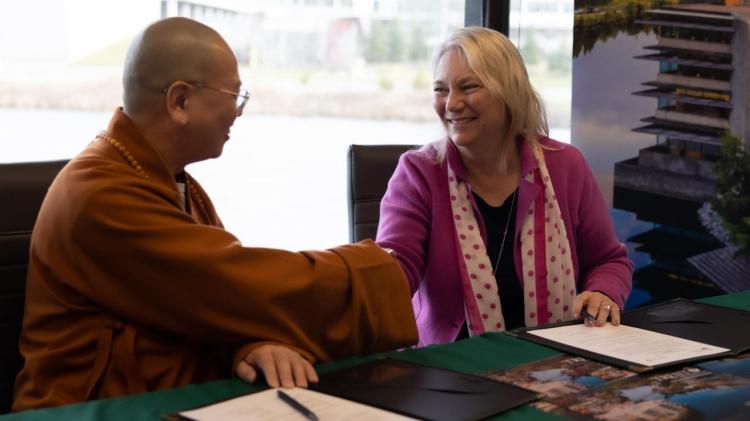A new agreement between Trent University and The Buddhist College of Canada (BCC) is set to break ground in cross-cultural learning with a memorandum of understanding (MOU) outlining diverse opportunities for collaborative education in the Peterborough area and beyond.
"Trent University and the Buddhist College of Canada share a deep commitment to community, personal well-being and the arts, as well as environmental stewardship and sustainable agriculture," said Dr. Cathy Bruce, president and vice-chancellor of Trent University. "We look forward to a range of academic, research, and experiential learning opportunities with the Wutai Shan Buddhist Garden going forward."

The Venerable Dayi Shi, president of the Buddhist College of Canada (left) and Dr. Cathy Bruce, president and vice-chancellor of Trent University (right) shake hands after signing a memorandum of understanding.
BCC is housed within the expansive Wutai Shan Buddhist Garden in the hills of Bethany (Cavan-Monaghan, Ontario), providing an ideal setting for many of Trent's students to apply the theory and concepts they study in class in a practical, cultural, and spiritual context. Students studying Business Administration, Communications, Sustainable Agriculture & Food Systems, Environmental Resource Science/Studies, and other subjects will have an opportunity to work with colleagues at the BCC to conduct research and contribute to solutions to real-world challenges.
Through the new MOU, BCC and Trent University will work together to build on each other's strengths and showcase both institutions' shared commitment to education, collaboration, and growth.
"This association represents a harmonious blending of knowledge and tradition," said the Venerable Dayi Shi, president of the Buddhist College of Canada. "By working together, we can inspire meaningful learning experiences for students while contributing to the growth and understanding of Buddhist philosophy, environmental stewardship, and cultural exchange within our community."
In addition to providing experiential learning opportunities, this collaboration will also facilitate opportunities for unique joint delivery of some academic courses, including Chinese history, spirituality, Eastern philosophy, and language learning.
"Our colleagues at the Buddhist College of Canada bring a depth of knowledge in Buddhist traditions, philosophy, and Chinese history," said Dr. Mark Skinner, dean of Humanities and Social Sciences at Trent University. "This partnership opens exciting opportunities for Trent students to learn from these inspiring experts, with our faculty integrating new experiential learning into our existing Arts degree programs and potentially new curriculum through the creation of micro-credentials that will leverage and showcase the knowledge and expertise at the BCC."
Students will have the opportunity to participate in community-based research projects centered on the development of the expansive Wutai Shan Buddhist Garden. Additionally, cultural exchange opportunities will allow students to immerse themselves in traditional Chinese practices, such as tea ceremonies, Chinese calligraphy, and meditation, offered as both micro-credentials and for-credit courses.
About The Buddhist College of Canada (BCC)
The Buddhist College of Canada (BCC) located within the serene and expansive Wutai Shan Buddhist Garden in Bethany (Cavan-Monaghan, ON) is a renowned institution dedicated to advancing the study and practice of Buddhist philosophy and traditions. School Motto: "Realize the Mind, Enlighten the World" - Striving for clear and profound insights, purifying the mind with wisdom, having a clear vision of worldly matters and fostering the well-being of all sentient beings with compassion. The BCC offers a tranquil environment for learning and reflection, serving as a hub for cultural exchange, academic excellence, and community engagement. With its focus on interdisciplinary learning and real-world application, the BCC provides students and scholars unique opportunities to explore Eastern philosophy, spirituality, and environmental stewardship.











